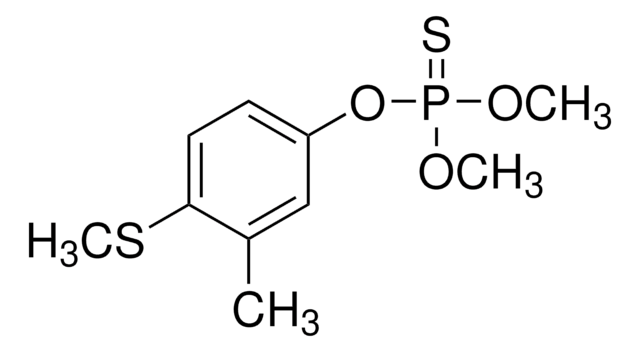46046
α-tert-Butyl-β-(4-chlorobenzyl)-1H-1,2,4-triazole-1-ethanol
PESTANAL®, analytical standard
Synonym(s):
Paclobutrazol
About This Item
Recommended Products
grade
analytical standard
Quality Level
description
mixture of stereo isomers
product line
PESTANAL®
shelf life
limited shelf life, expiry date on the label
technique(s)
HPLC: suitable
gas chromatography (GC): suitable
application(s)
agriculture
format
neat
SMILES string
OC(C(C)(C)C)C(N1N=CN=C1)CC2=CC=C(Cl)C=C2
InChI
1S/C15H20ClN3O/c1-15(2,3)14(20)13(19-10-17-9-18-19)8-11-4-6-12(16)7-5-11/h4-7,9-10,13-14,20H,8H2,1-3H3
InChI key
RMOGWMIKYWRTKW-UHFFFAOYSA-N
Looking for similar products? Visit Product Comparison Guide
General description
Application
- Apple juice samples by matrix solid-phase dispersion (MSPD) and gas chromatography-mass selective detection (GC-MSD) with electron impact (EI) ionization.
- Processed fruits and vegetables by miniaturized extraction-partition and liquid chromatography-electrospray tandem mass spectrometry (LC-ESI-MS/MS) equipped with multiple reaction monitoring (MRM) detection.
- Crops and soya grains by LC-ESI-MS/MS with MRM detection.
Legal Information
Not finding the right product?
Try our Product Selector Tool.
Signal Word
Danger
Hazard Statements
Precautionary Statements
Hazard Classifications
Acute Tox. 4 Inhalation - Acute Tox. 4 Oral - Aquatic Acute 1 - Aquatic Chronic 1 - Eye Irrit. 2 - Flam. Sol. 1 - Repr. 2
Storage Class Code
4.1B - Flammable solid hazardous materials
WGK
WGK 3
Flash Point(F)
Not applicable
Flash Point(C)
Not applicable
Personal Protective Equipment
Choose from one of the most recent versions:
Already Own This Product?
Find documentation for the products that you have recently purchased in the Document Library.
Customers Also Viewed
Our team of scientists has experience in all areas of research including Life Science, Material Science, Chemical Synthesis, Chromatography, Analytical and many others.
Contact Technical Service



















